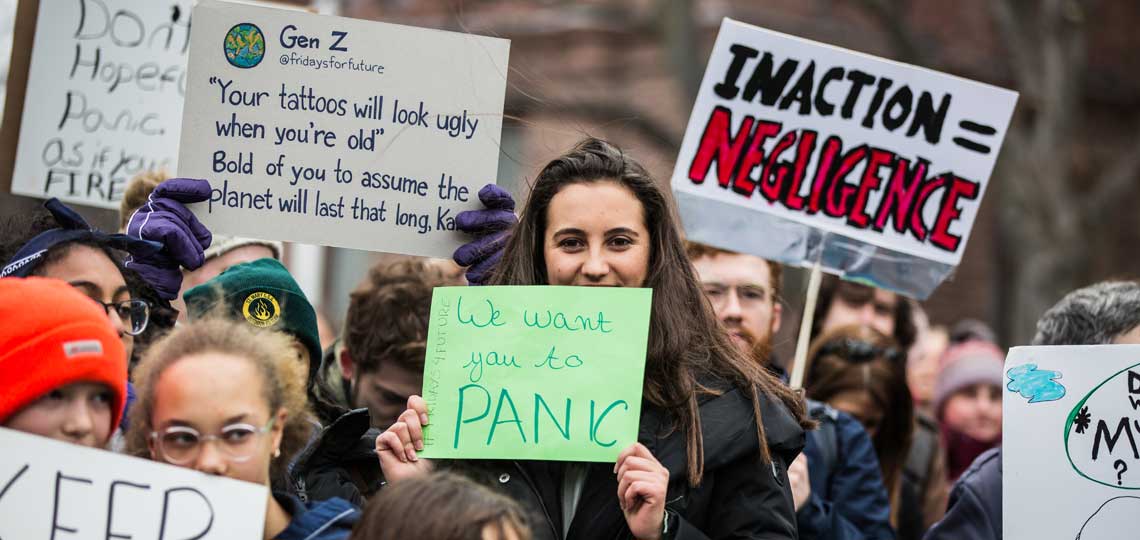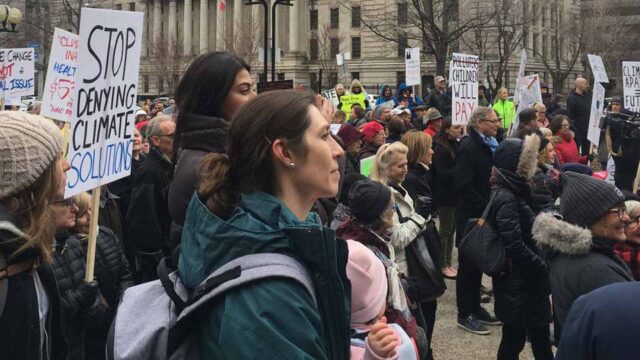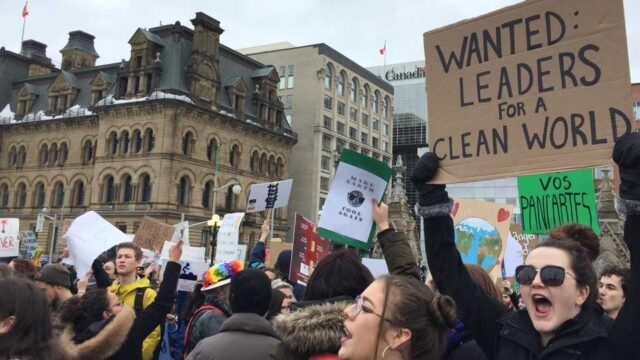It started with a 15-year-old named Greta Thunberg, striking alone at the Swedish parliament instead of going to her Friday classes.
Less than a year later, the Fridays for Future movement has gone global.
Inspired by Thunberg, who is now 16, youth around the world are taking a stand. According to organizers, more than 1.4 million young people took part in a global strike on March 15, 2019. And momentum is growing.
In Canada, student leaders are hard at work, planning a nation-wide strike for May 3.
It is an incredible moment in history. Young people are raising their voices and we need to listen and support them in any way we can.
This means showing up for them at climate strikes — but letting youth hold the megaphone and lead the marches. It means talking with the young people in your life about climate change and listening to their concerns. It means factoring intergenerational equity, the idea that future generations have a right to inherit a livable earth (and one of Ecojustice’s guiding principles), into policy decisions and laws.
And it means voting with the environment in mind, because many of the people whose futures will be most affected by climate change are also part of a demographic that cannot yet vote.
(Want more info on how to help? Check out this great guide for students, parents, teachers and school staff on how to support the Fridays for Future strikes.)
To ignore the young climate strikers is to ignore the very real ways climate threatens their future.
That’s why we’re dedicating this blog to the young Canadian activists who are leading the charge against climate change in this country.
We spoke with three young people, Emma-Jane, Stephanie, and Aliénor about how they first got involved in the strikes, how they stay hopeful, and what they’d say if they had a chance to talk face to face with Prime Minister Justin Trudeau. Here’s what they had to say:
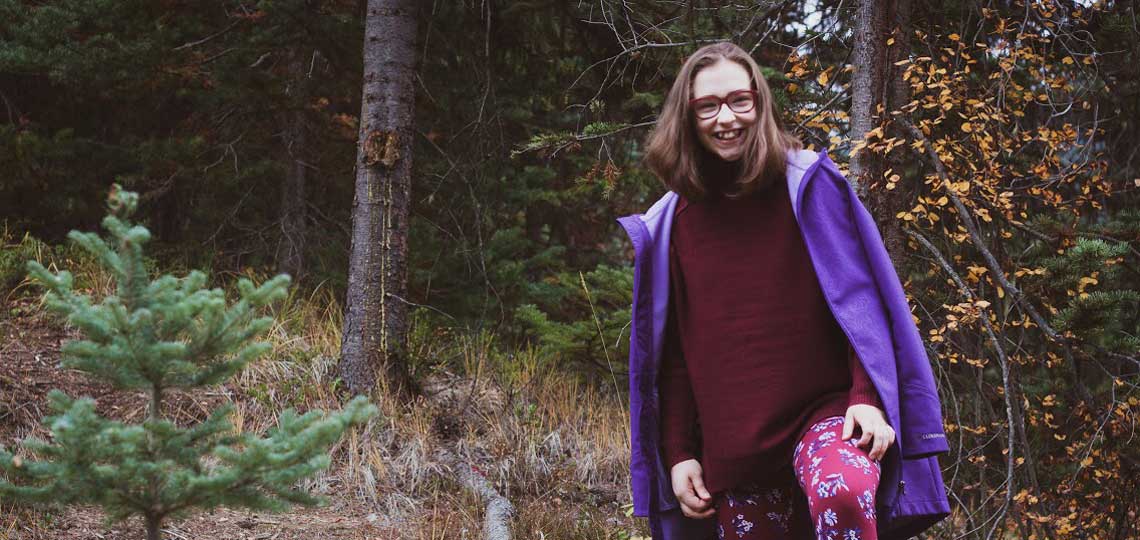
Photo courtesy of Emma-Jane Burian
Emma-Jane Burian
Age: 16
City: Victoria, B.C.
Quotable moment: “This is the most important issue of our time, and together we must rise.”
Emma-Jane Burian’s seen firsthand how climate change can impact the people she cares about.
As a student at an online school, the 16-year-old has classmates from across British Columbia. Last summer, when forest fires broke out in the province’s interior, Burian said the blazes forced five of her friends to evacuate their homes.
“I remember talking to them and they were so scared that something would happen to one of their neighbours or their house,” Burian said. She told them, “We can’t keep letting this happen.”
Burian is the co-leader of Victoria’s Our Earth, Our Future, a group that organizes the climate strikes in Victoria and works with municipal politicians to create local change.
A grade 11 student, Burian said her passion for science was what first piqued her interest in climate change.
“I love science and so anything to do with science really interests me,” she said in a phone call with Ecojustice. “Climate change has been something that I’ve always cared about, but I really started to get more into it when I was looking at the IPCC report and I started doing a lot of research into that.”
While Burian said she wants to study physics in the future, her eventual goal is to be a human rights lawyer. And she’s already started to make connections between the Charter of Rights and Freedoms and how climate change impacts Canadians.
“We simply can’t continue to put people at such great risk. I believe it violates Section 7 of the Charter, which states that everyone has the right to life, liberty and security of the person,” Burian said.
If she had a chance to sit down with Prime Minister Justin Trudeau, Burian said she’d tell him that youth across Canada care deeply about climate change and that they will only vote for a government that takes bold action to keep global warming to 1.5 C and grounds its policies in science and human rights.
“Then I would ask, ‘How is your government going to do this?’” she said.
As for her advice to other youth who want to take a stand?
“Don’t be afraid to follow what you think is right and what you believe in.” Burian said. “This is the most important issue of our time, and together we must rise.”
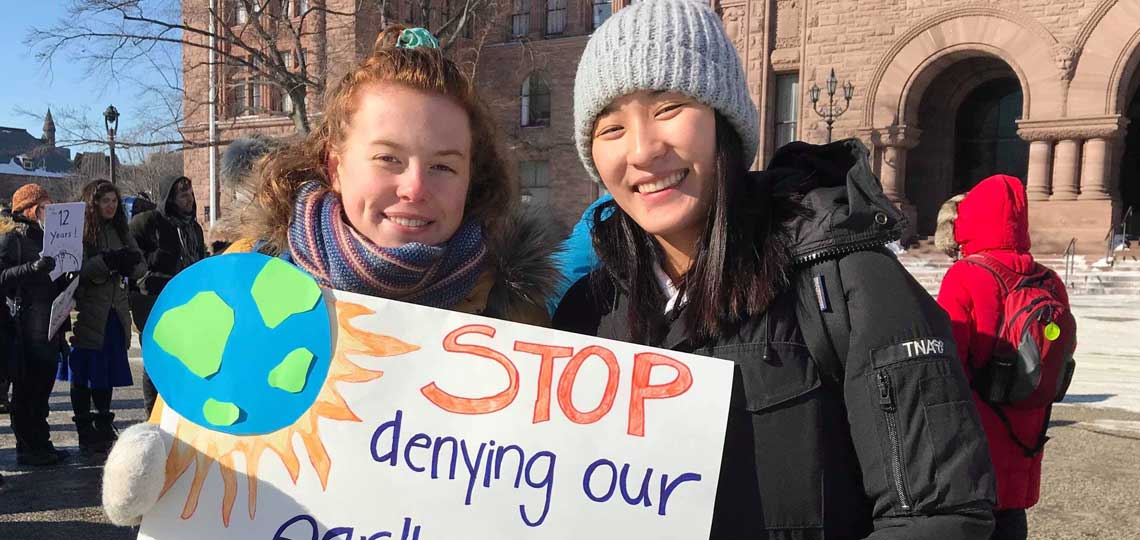
Photo courtesy of Stephanie Vienneau (left)
Stephanie Vienneau
Age: 18
City: Mississauga, Ont.
Quotable moment: “This government has a responsibility to listen to young people because we’re going to be voting for the next government.”
The first time Stephanie Vienneau attended a “youth” climate strike, the adults in attendance outnumbered the young people.
That was back in February. Only a few months later, things are changing.
“As time has gone on there’s been more and more kids,” Vienneau said in a phone interview.
Vienneau works at an environment-focused summer camp and it there that she first heard about Greta Thunberg, the young Swedish activist striking for climate change.
Vienneau was so inspired by Thunberg that she decided to look up local climate strikes. She connected with a group on Instagram and started attending monthly strikes at Queen’s Park in Toronto.
Now, Vienneau said she’s looking forward to building on the momentum from the global youth climate strike on March 15 as she prepares for the national strike on May 3.
“We only have 11 years left to fight, the science does not lie.” Vienneau said. “It’s so important that all the youth come out and use their voice to tell the government we need to act now.”
If she had a chance to speak with Prime Minister Justin Trudeau and Minister of Environment and Climate Change Catherine McKenna, Vienneau said she’d tell them to listen up.
“I’d probably emphasize that, as youth, we have very strong voices and the things and the ideas we have are very unique,” she said. “The government has a responsibility to listen to young people because we’re going to be voting for the next government.”
Vienneau said Thunberg — who first inspired the Mississauga teen to start striking for the climate — continues to be a source of motivation.
“The biggest thing I learned from [Thunberg] is to take action,” she said. “As Greta says, ‘our house is on fire’ and it’s our responsibility to put it out!”
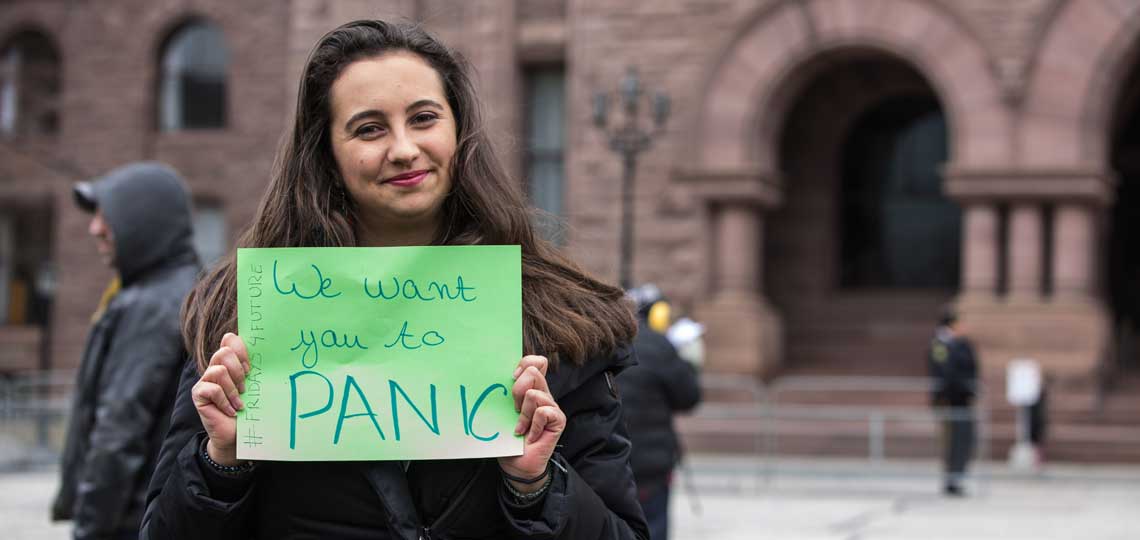
Photo courtesy of Aliénor Rougeot
Aliénor Rougeot
Age: 20
City: Toronto, Ont.
Quotable moment: “I understand how scary this is. Apathy’s a real thing. Don’t give up because that’s really when things are lost. Don’t be paralyzed by fear.”
Aliénor Rougeot, the 20-year-old who leads Toronto’s Fridays for Future strikes, said she has an almost-instinctive urge to protect the nature that surrounded her as she grew up.
“I feel a strong connection to nature. I would hate to rob that from any other child,” Rougeot told Ecojustice.
Her passion for human rights, she said, is another driving factor.
“I identify as a feminist and we know that women, people of colour, marginalized communities, will be more affected by climate change.”
She added, “Because we’re in Canada we should always really think of our movement and activism with the lens that many of us are settlers … Indigenous people have taken care of this land for millennia and so we have to listen to them and we have to include them in this movement.”
If Rougeot could deliver a message to Prime Minister Justin Trudeau and Minister of Environment and Climate Change Catherine McKenna, she said she’d tell them that they shouldn’t pass any policies without considering the environment. After all, she said, you can’t run a business or convince voters to elect you once the planet is dead.
Given the opportunity to speak with Ontario Premier Doug Ford, Rougeot said she’d be even more candid.
“I’d really want to ask Doug Ford, ‘would you be able to look a child in the eye and say I’m consciously hurting your future?’ ”
Asked about what advice she’d offer to young people whose futures are on the line, Rougeot said that, while strikes are a “wonderful” step, she also realizes they aren’t feasible for every student. Instead of or in addition to striking, Rougeot encourages youth to talk to their parents about climate change every single day, ask teachers to build climate change into their curriculum, call city councillors and send video appeals to politicians.
“Never think that whatever you’re doing won’t matter,” she said. “I understand how scary this is. Apathy’s a real thing. Don’t give up because that’s really when things are lost. Don’t be paralyzed by fear.”
Join the national climate strike on May 3
Show your support for Emma-Jane, Stephanie, Aliénor, and other young people across the country by backing the national climate strike on Friday, May 3.
For more information, please visit the Fridays for Future Canada website, where you can find a map of planned events and a toolkit for participants.
Ecojustice is committed to using the power of the law to combat climate change. Our lawyers are currently exploring innovative ways to go to court and hold government accountable for acting on climate change. And, starting with this blog, we’re strengthening our commitment to listening to young people and amplify their voices through Ecojustice’s platforms.
You can help. If you’re a young person with your own climate story to share, you can get in touch with us via our online Fridays for Future form.
Together, we can build the case for a better earth and a safer climate.

